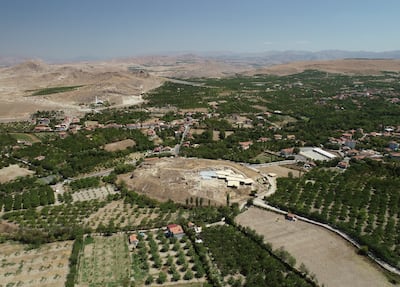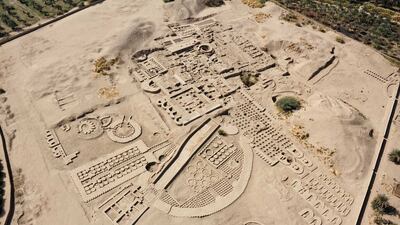For five years the UAE-backed heritage protection group Aliph has spent $90 million fighting to save cultural sites in global conflict zones but now its work is increasingly dominated by the parallel impact of climate change.
Through its more than 400 projects in 35 countries, one constant theme has been apparent – the effect of extreme climate events on sites at risk.
According to Unesco, one in three natural sites and one in six cultural heritage sites are currently under threat from climate change.
At Cop28 in Dubai last year, Aliph, which is the international alliance for the protection of heritage in conflict zones, used the global stage to raise the urgent need to tackle the effects of climate change on cultural sites.
It has now led the group to announce it will fund $10 million of specialist projects dedicated to protecting heritage endangered by climate change.
Aliph was founded in Geneva in 2017 to strengthen the international response to the Conference on Safeguarding Endangered Cultural Heritage, held in Abu Dhabi in December 2016.
It has completed 233 projects since its inception and currently has another 168 ongoing, with more set for the coming months.
As part of a new package of 12 emergency projects, four will be in Sudan, including a centre inside the Khalifa House museum in Omdurman where items heritage can be stored in an emergency.
Aliph’s director of strategy Bastien Varoutsikos told The National the impact of climate change – from flooding to extreme heat – is apparent at all of its project sites.
“There is an increasing intersection between conflicts and climate change impacts,” he said. “We see it in many of the countries where we have operations and it made sense that as we grow, we realised that one of the key aspects of Aliph’s DNA is its ability to identify and support projects in the most complex and challenging environments."
“The goal of the project is part of a broader strategy that Aliph is implementing over the next few years so that by the end of the cycle addressing climate change impact will be integrated into our strategy.”
It is focusing its first phase of action in Africa.
“In order to kickstart that effort we needed a limited geographical area and for many reasons Africa seemed like a really good candidate,” Mr Varoutsikos said.
“It has does not have a high ability to address the emergencies that climate change will trigger. It is also where we have a few projects but we want to do more.
“We want to use traditional know-how and technology, which will be integrated into a heritage friendly approach to support heritage projects in a way that will be more sustainable and carbon efficient.”
It is also launching a project to preserve the Royal City of Meroe and its pyramids in Sudan. This will provide urgent protection from flooding through the reinforcement of the existing dyke, and by planting acacias trees to preserve the site in a sustainable way.
It will also be running a campaign, in collaboration with the Louvre, to raise awareness of the importance of heritage protection, including from the threat of illicit trafficking.
Another project will be the emergency documentation of collections of the Kerma Museum in Sudan to protect them from the threat of looting, illegal export and sale in the event of the armed conflict reaching Kerma.
Aliph’s director of programmes Elke Selter told The National flooding in Sudan is becoming more severe and urgent action is needed.
“We have four projects in Sudan, all of which are to protect sites and museum collections in the face of certain conflict. One is to protect dykes which have been washed away by seasonal floods and reinforce parts which have been washed away by using trees,” she said.
“The floods are getting more severe than they used to be and we need to look at more sustainable solutions.”

She said Aliph's biggest project is in Afghanistan where one of the most important archaeological discoveries in the past 40 years in the Middle East was made, with thousands of Buddhist artefacts unearthed in a disused mine – the second-largest copper deposit in the world.
More than 3,500 artefacts, statues and wall paintings dating back to the 3rd century were found at Mes Aynak, Afghanistan's biggest mine, 40km south-east of Kabul.
Despite rigorous efforts to save them, they are now facing a race against time to be protected as the Taliban and mining companies seek to reopen the site later this year.
Salvage operations were suspended in 2019 resulting in extensive decay and degradation of exposed archaeological areas and artefact remains. Aliph is now funding a $2.2 million mission to safeguard the site and its treasures.
The Mes Aynak settlement dates back to the Bronze Age and flourished between the 1st century BCE and the 7th century.
It became an important centre on the Buddhist pilgrimage route to Bamiyan and on the Silk Road.
It covers an area of 45 hectares and has numerous Buddhist monasteries housing stupas, sculptures and paintings, as well as Zoroastrian temples, houses, roads and industrial implements dating back to late antiquity.
Two of Aliph's latest projects will be in Lebanon to safeguard the historic audiovisual heritage of TeleLiban archives, the Lebanese national TV channel, and the restoration of the 14th-century Hammam Al Nouri, recently named the Arab League's cultural capital for 2024, repurposing it to become a space for the promotion of traditional jewellery.
In Turkey, it is conducting post-earthquake recovery at Arslantepe World Heritage site and in Syria it is carrying out emergency stabilisation work at the 7th-century Najm Castle near Manbij, which was damaged by the earthquake of February 2023.

Najm castle is one of the most important Islamic medieval fortresses in the Euphrates basin. Work required includes reconstruction of masonry walls and roofs, reinforcement of ceilings and walls with wooden beams and metal struts, injecting cracks with suitable mortar, in addition to widespread waterproofing.
Separately, Aliph has also launched a new $1 million initiative in Gaza, which includes training Palestinians in cultural heritage 'first aid', teaching them how to recover and protect collections.
This has helped in the evacuation and protection of collections from two Gaza museums, as well as the emergency documentation and stabilisation of three damaged heritage sites in the enclave, including Al Omari Mosque.
In its 2024 report, the European Parliament’s research service said the impact of climate change on cultural sites needs urgent attention.
“These threats must be addressed to protect valuable sites and preserve them for future generations,” it said.
“”Research on climate change is not a novelty, but climate change as it relates to cultural heritage is a relatively new area of exploration and policy.
“Climate change has accelerated in recent years, with summer temperatures in parts of the EU reaching 40°C (and 35°C indoors). Successive droughts and torrential rains resulting in floods accompany these hikes in temperature. Ongoing melting of glaciers and ice caps is leading to rising sea and ocean levels.
“The rapid increase in the frequency of climate-related extreme events necessitate deep investigation into their consequences for the cultural heritage sector. The results of such research can help us mitigate the impact of climate change on cultural heritage.”
It said rising sea and ocean levels due to climate change constitute the biggest threat to cultural heritage in Europe.
Aliph’s vice-chairman Mohamed Khalifa Al Mubarak, who is also chairman of the Department of Culture and Tourism in Abu Dhabi, this week said the UAE was proud to continue supporting initiatives across the globe.
“Abu Dhabi is where Aliph’s story began in 2017, when the first conference brought together public, private and nongovernmental institutions to commit to protecting and preserving endangered cultural heritage, particularly in areas afflicted by war, unrest, or terrorism,” he wrote in the annual report.
“Since this gathering, Aliph has been working tirelessly to intervene in areas of conflict around the world, from Syria, Iraq and Mali, to Lebanon, Afghanistan, Ukraine and Armenia.
“Continuing in our mission to protect the world’s heritage, preserve endangered cultural property and restore sites of cultural significance, our team in 2023 once again proved its ability to act as Cultural Heritage First Responders.
“The United Arab Emirates is proud to continue leading this initiative alongside our longstanding cultural partner, France. We are committed to protecting cultural heritage for future generations.”
Dr Sandra Bialystok, director of communications at Aliph, told The National its new future focus will feature less “band aid solutions” and will "turn the clock back" to use traditional methods to help ensure culture is protected for future generations.
“What is unique and important about the strategy is that it is moving the needle back to a starting point,” she said. “We are looking at the traditional techniques and knowledge that are always used in order to build and construct, and modes of technology that will actually allow us to move into a virtuous cycle of reconstruction."
Every day Mr Varoutsikos sees first-hand the impact climate change is having when he visits Aliph’s projects on the ground.
He led calls at Cop28 for the international community to address the role that culture can play in fighting climate change and now he has reinvigorated faith in the work Aliph can now achieve with this new direction.
“We see the climate change impact in all the countries where we have operations,” he said.
“One of the key aspects of this is that we will now get to support specialist projects whose impacts will be seen for years to come. Protecting culture is of the utmost importance for the communities that live by it. It is their identity and now we can help protect it.”


